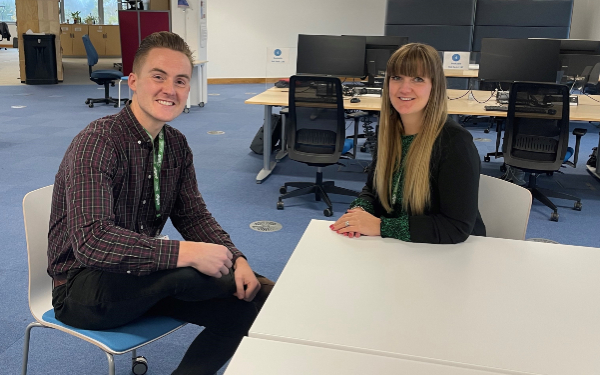“I came to South Gloucestershire because I wanted to work in a place where I felt I could work therapeutically.”
Fostering social worker Anna is discussing her motivations for joining South Gloucestershire Council three-and-a-half years ago.
Chief among them was the fact that, at the time, the authority was setting up a therapeutic pathway team, designed to support children to move out of residential care, or not enter it in the first place, if that was not what they needed.
‘What I came into social work to do’
Working with the team, Anna helped prevent two children from going into residential care and supported another to move into foster care from a children’s home.
“If you can bring someone back from residential and they are now doing well in foster care, that’s what I came into social work to do,” she says. “All three situations have been really good outcomes for the children.”
The team was originally established on a temporary basis, staffed by two agency social workers, but it was recently fully established within South Gloucestershire as Waypoint. As well as providing children with alternatives to residential care, the team has now expanded into working with families to prevent children going into care in the first place.
Aimee Williams, service manager for fostering, permanence and Waypoint, says: “A waypoint is an intermediate point or place on a route or line of travel; a stopping point at which a course is changed, and this fundamentally describes the work of this team. Waypoint comes alongside children, their families, carers, and networks; it builds and strengthens relationships and helps enable positive change.”
She says the team has “brought a new dynamic and a new energy to the service. Their passion and creativity is fantastic and the wider teams have embraced their support”.
This is certainly the experience of Anna and children in care social worker Rashid.
‘They put a lot of work into building relationships’
He worked with the Waypoint team in relation to a young man in a foster placement, who was identified as being at risk of exploitation. His foster carers were worried that they could not protect him, and the placement was at risk of breaking down.
Rashid says Waypoint senior practitioner Alex and social work assistant Matt put “a lot of work into building relationships and trust”, making it clear to the young person that they were there for as long as he needed them.
“Alex and Matt, they don’t give up easily,” he says. “If the young person is in running shorts, they will go for a run with them. They will do anything that will ensure engagement. They want the young person to lead the activity and they have very good listening skills, and a lot of our young people want to be listened to.”
For the foster carer, the outcome of Waypoint’s work was that they felt supported and, as a result, felt able to support the young person and maintain the placement.
“The foster carer didn’t feel that the risk was only theirs, the young person was not only their responsibility,” Rashid adds.
Benefits for social workers
What about the benefit for him as a social worker?
Rashid says a key advantage is that Waypoint is able to come in and do intensive work with children alongside the work of the child’s social worker.
“Waypoint works with those children who need extra intervention, where they can do some therapeutic work,” he says. “With other children it’s not necessary because the placement is quite stable.”
Alex, the Waypoint senior practitioner Rashid worked with in relation to this particular young person, stresses that a core part of his role is to support fellow social workers across the service. As well as working directly with children and carers, social workers can book consultations with the Waypoint team to discuss particular children and young people they feel might benefit from its support.
If a referral into the service is agreed, then Waypoint may start doing regular direct work with the child or their foster carer or join meetings of the professional network around the child.
Direct work

Waypoint social worker Alex
In relation to foster carers, Alex says: “If there are behaviours that are difficult to manage, it’s about providing space to look at why that is – looking at it therapeutically rather than looking at it in a reactive way. We need to be realistic, it’s about providing the opportunity for that foster carer to talk to us.”
For the child, the focus is on striving to capture their voice, using the most appropriate direct work tool for that young person.
“It may be an A3 piece of paper, and we can write down their emotions, or they can write a letter to their parents or foster carer telling them how they are feeling,” he says.
“There’s been a young person who is fascinated with Dr Who and struggles to not talk about Dr Who in any setting, so it’s about thinking creatively about obtaining information about that child. Could I use scaling questions with a Dr Who basis? It will show that child that we have responded to them and their interests. We can then hopefully change the narrative about decisions made without them being listened to. We want to shift that, so those decisions are made with their voice.”
Source of stability
“We hope we can be that stability for the child, and the foster carer, so they can become familiar with us,” Alex says. “They need to know they can trust us. I would struggle if a person I had never met came and asked me about my life.”
For a child moving from residential to foster care, he says this “helps with the transition process”.
“A placement move is going to be unsettling so we might then see changes in their behaviour. The foster carer may struggle with that. We hope that we’re able to provide that opportunity to pinpoint what’s happened, why it’s happening and what we need to do, to make sure they have the best available support.”
Anna says the same approach is felt by the foster carers the team works with and describes the importance of involving carers in the transition when a child is moving from residential care to a foster placement.
“The foster carers have always maintained that the support from the team and myself – I was doing weekly supervision with them for a while – was really important,” she says. “They felt there was always someone there to turn to and they felt really held.”
Like Rashid, a key benefit for her is Waypoint’s ability to bring professionals together to support children and carers and think differently about situations. Another benefit of working with Waypoint, for her as a social worker, is working in partnership with other practitioners: “Being a social worker can be quite isolating, especially during the pandemic. To feel part of something bigger is really good for your morale and confidence.”
Range of support for children in care social workers
Nicola Hannaford, service manager for children in care and care leavers, says that Waypoint is “one of a number of excellent and dynamic services that provide direct support to the children in care team”. This helps it provide children and young people with “permanence, stability and improved outcomes so they can be well prepared for and excited about their future”.
Another source of guidance for the children in care team is the Thinking Aloud service, which both supports children and young people in care with their emotional and mental health needs and aids the social workers and carers working with them in delivering trauma-informed practice.
Children in care social workers are also supported in carrying out life story work by a therapeutic life story service and are currently being trained in systemic practice. Nicola adds that the service is now developing a specialised hub within the team for young people seeking asylum “so we can provide a bespoke and highly skilled and responsive service that is consistent with this group of children and young people’s needs”.
In addition, she says, practitioners also benefit from leaders who are “trained in compassionate leadership to promote a nurturing, supportive and compassionate approach to the development and line management of staff to ensure they are effectively supported in dealing with trauma and the challenges in social work practice”.
If you’re interested in finding out more about Waypoint or the children in care team and about opportunities at South Gloucestershire Council, check out the latest vacancies.




 Facebook
Facebook X
X LinkedIn
LinkedIn Instagram
Instagram